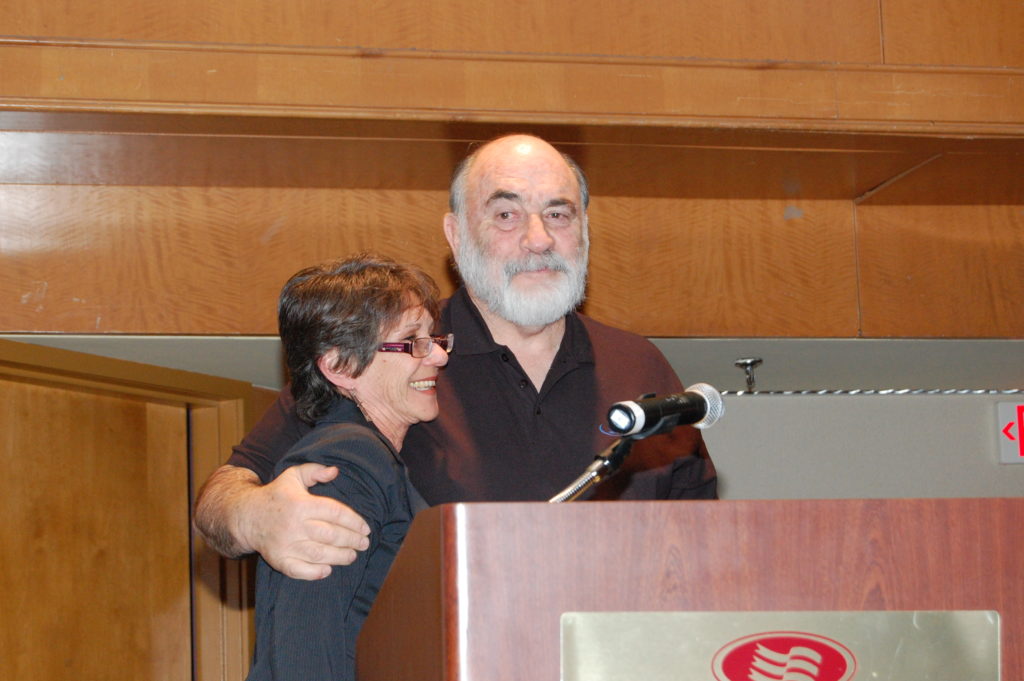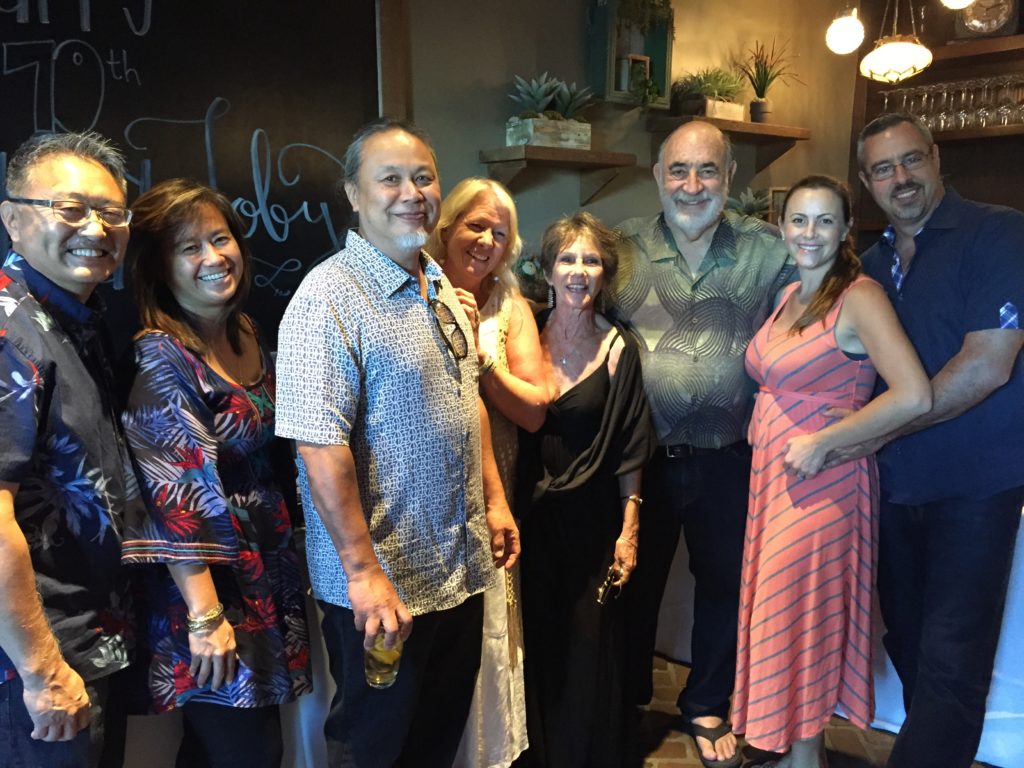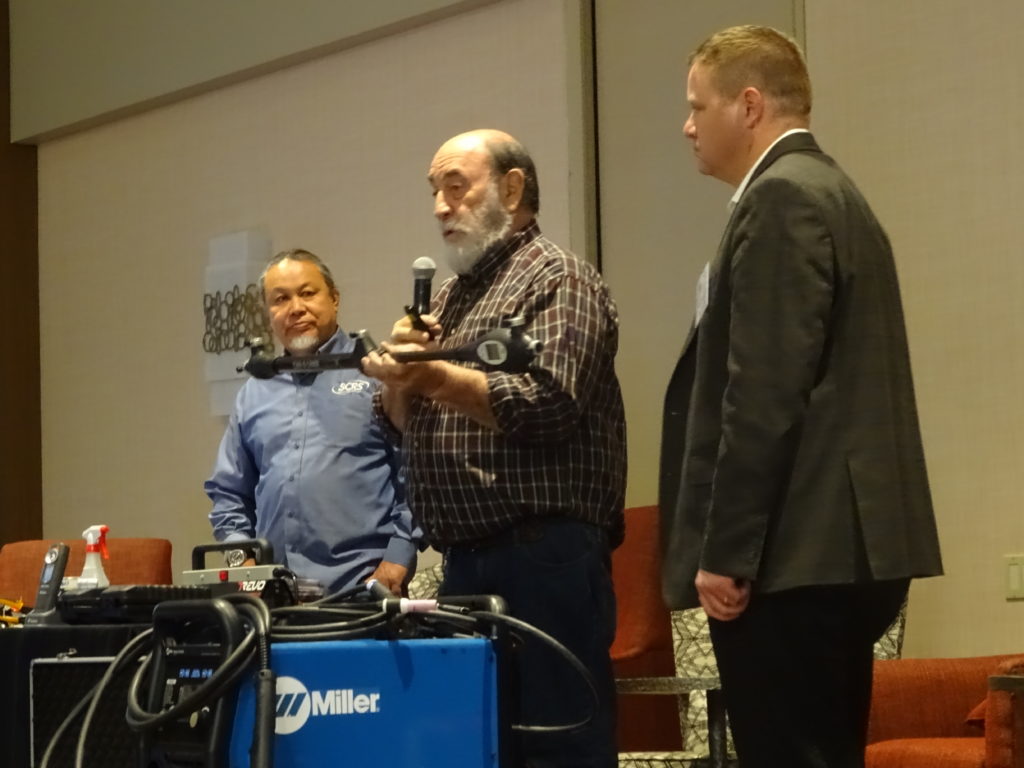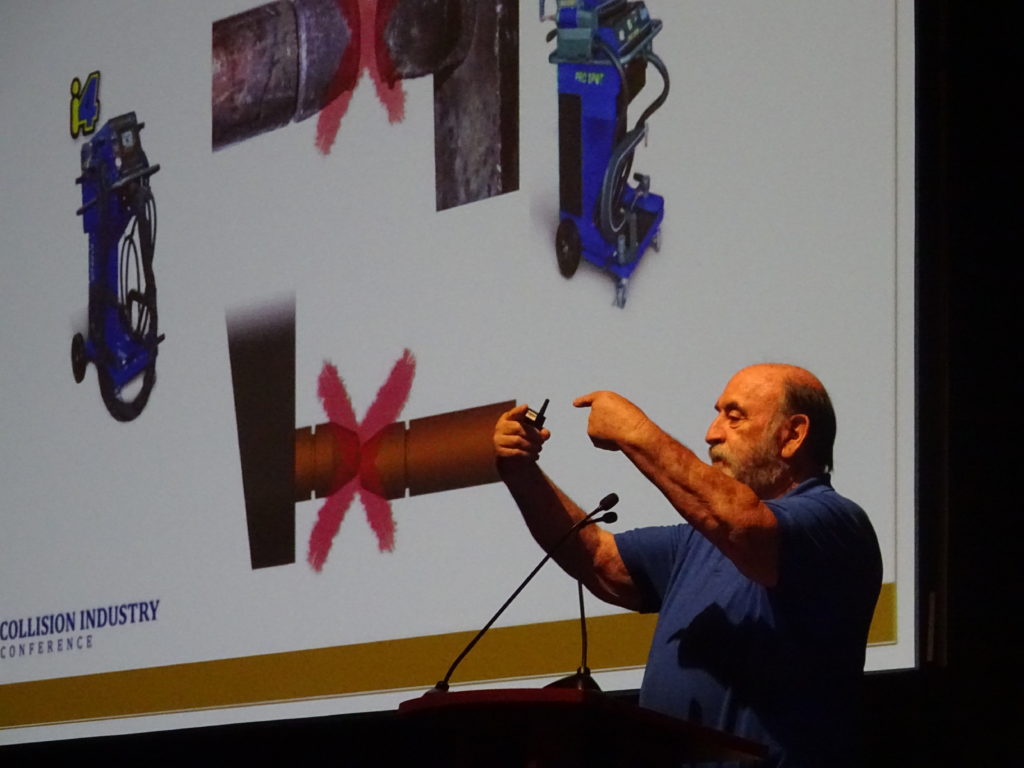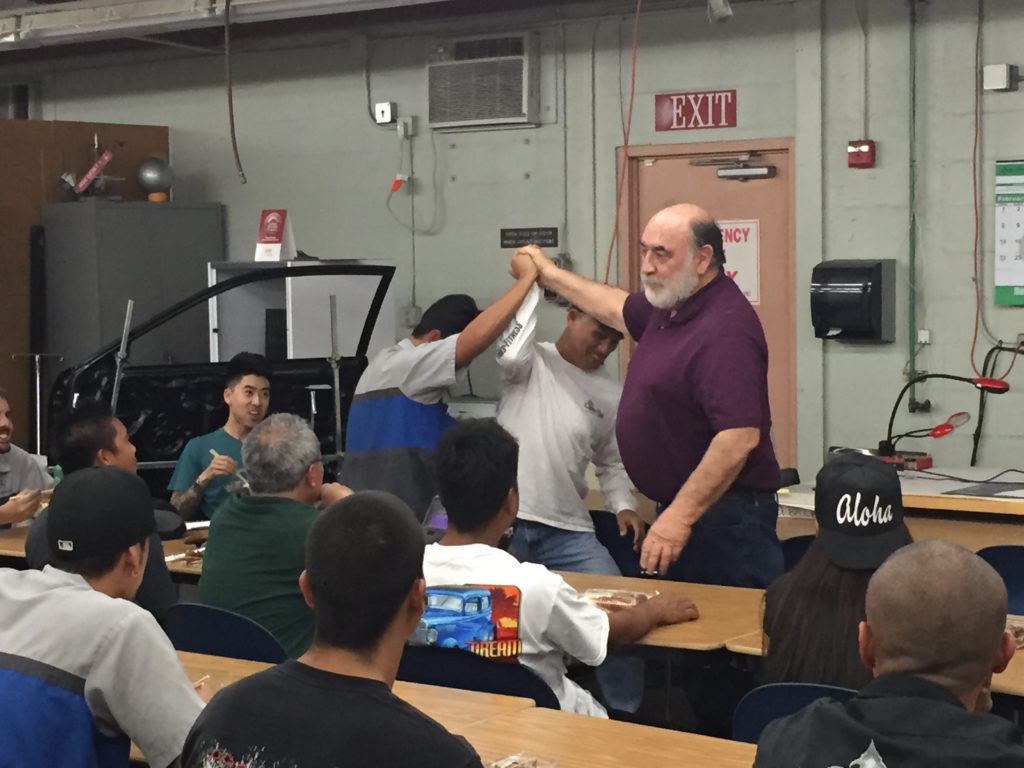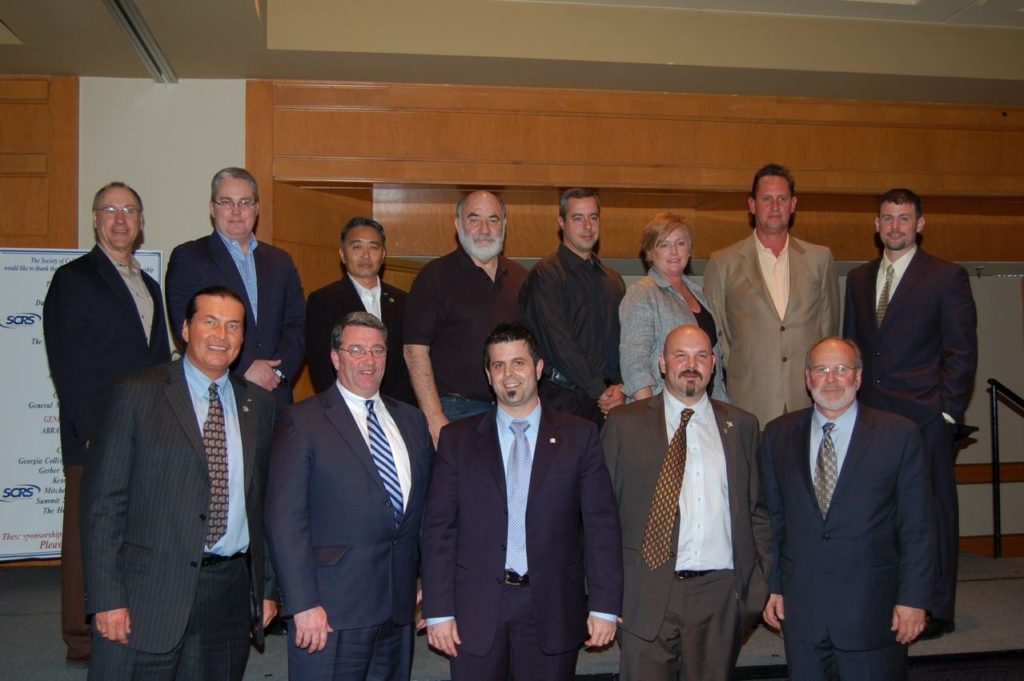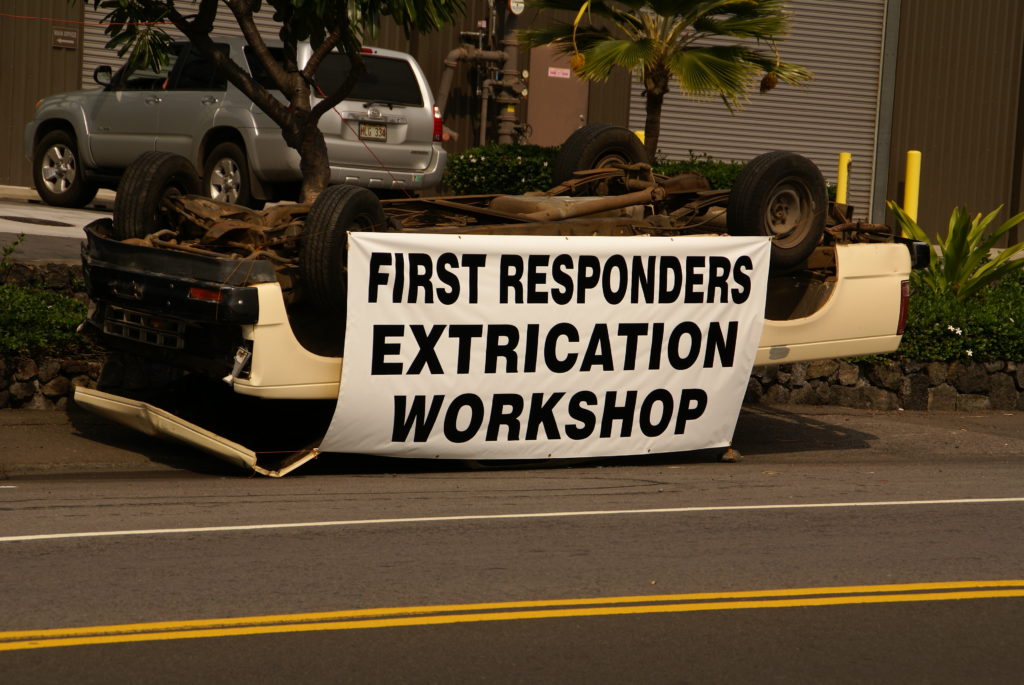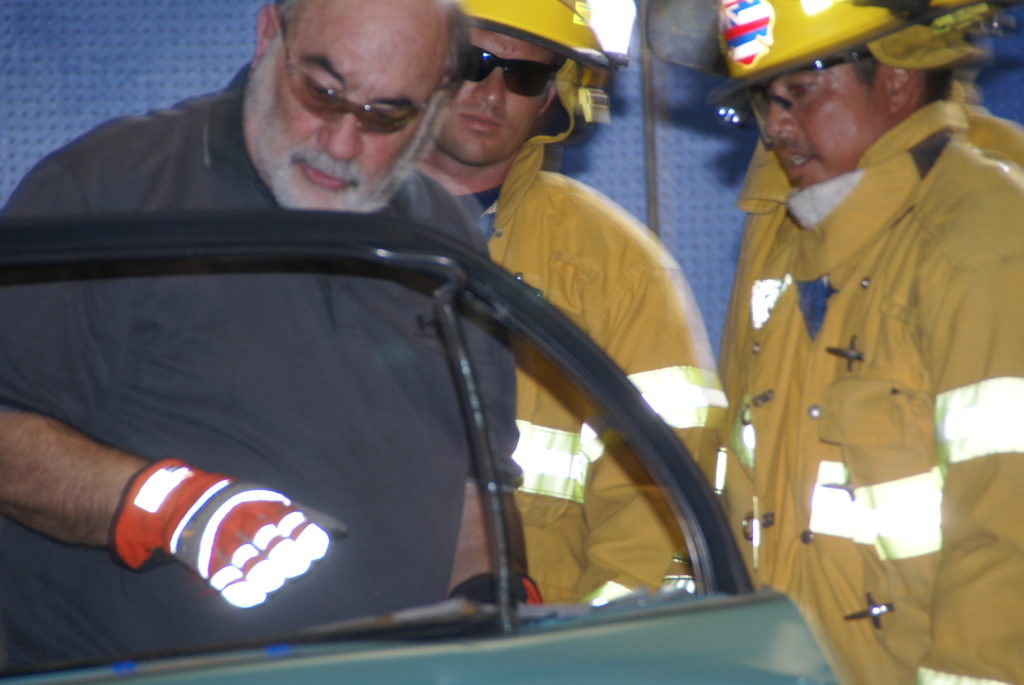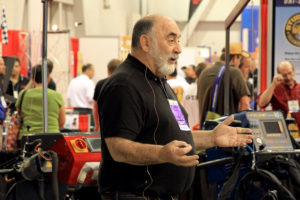
Celebrating Toby Chess, still giving to the industry, undeterred by age or illness
By onAnnouncements | Associations | Business Practices | Education | Market Trends | Repair Operations
Fifteen years ago, Toby Chess hooked a trailer to a truck and began traveling around the country teaching I-CAR welding tests.
The first month, he administered 80 exams. The second year, he racked up more than 800.
Over the next decade and a half, Chess has continued to deliver countless more welding sessions. He also worked a day job at Kent Automotive, served on the Society of Collision Repair Specialists board until 2011, and educated the industry with Collision Industry Conference and SCRS presentations.
Of course, Chess had already made his mark on the industry before that point 15 years ago. CIC records show him as the Co-Chairman of the Write it Right Committee as early as 2000. He was inducted into the Hall of Eagles in 2003.
These statistics and achievements illustrate a career and man colleagues honored as energetic, passionate and dedicated to the collision industry and its education. Chess had probably visited more body shops than “anybody on the planet,” Kent Automotive co-worker Steve Fuhrman said.
Chess has continued to serve the industry despite end-stage kidney disease. He’s needed dialysis for 2.5 years and been on the list of Americans needing transplants for three. (Learn more about helping him here.) Yet despite this condition and having passed his 75th birthday, he’s still producing or planning industry resources.
“For someone that doesn’t have any skin in the game (own a body shop) … he is one of the most passionate people” in the industry, said Kye Yeung, Chess’ partner on SCRS and CIC educational presentations for years.
Chess’ contributions aren’t an attention play, said Yeung, the owner of European Motor Car Works. He said he’s seen Chess “dog-tired,” and “he still sacrifices his health” for the industry.
“I’d be a crybaby,” Yeung said. “… But not him.”
Society of Collision Repair Specialists Executive Director Aaron Schulenburg noted that Chess had probably received more accolades for his work than virtually any other individual. In addition to his Hall of Eagles induction, Chess has earned virtually every one of SCRS’ honors for individuals, including the SCRS’ Lifetime Achievement Award and an Honorary Lifetime Membership.
“It takes a really special individual” to stand out in so many different ways, Schulenburg said.
JD Hendler/Associates owner and CIC Administrator Jeff Hendler said he’d known Chess a “long, long time” through work with the California Autobody Association chapters. Chess had always been very dedicated to repairers, Hendler said.
Chess’ Collision Industry Conference technical presentations — which he and the late March Taylor started about 17 years ago — were an example of how Chess wanted to help as many people as he could, Hendler said.
They drew a “really positive reaction” from repairers, and “even more so” today when the material can be reviewed online, Hendler said.
Hendler recalled that while traveling around the country for state association and body shop group workshops, every trade show would have “something going on with Toby.”
‘Kina’ole guy’
Repairers described Chess’ friendship with Taylor, the late owner of Auto Body Hawaii, and continuation of their work.
For both Chess and Taylor, the repairer came first. “Always,” Hendler said.
Dorn’s Body & Paint owner Barry Dorn met Chess through Taylor around 2002.
“He was someone who always inspired me to be better,” Dorn said. Chess always pushed and tested him, he said.
“That’s something I needed,” he said.
Dorn said he always associated Taylor and Chess. “They were like Frick and Frack.”
Since Taylor died, Chess has continued the quest to encourage correct repairs and arming every repairer with the necessary information.
“That’s what Toby has been about ever since I’ve known him,” Dorn said.
Despite his health issue, Chess continues to try and help everyone on “every avenue” he can, Hendler said.
“You can draw a big circle around Toby’s chest,” and all you’ll find is he’s “totally dedicated to doing the right thing” for the proper reasons, Hendler said.
Doing the right thing for the right reasons defines the Hawaiian concept of “kina’ole” Taylor advocated, and Hendler called Chess “a kina’ole guy.”
Chess “cares passionately,” and would work for free — and has done so, just because it was the right thing, Hendler said. Not many in the industry “wear that banner,” he said.
“I’m proud to stand shoulder to shoulder with him,” Hendler said.
Current Auto Body Hawaii owner Dale Matsumoto recalled Chess visiting the shop as an I-CAR instructor and working with Taylor.
After Taylor died, “We kind of just gravitated together,” Matsumoto said.
Matsumoto was nominated to the SCRS board, where Chess was serving as a director. Matsumoto had been close to Taylor, but didn’t know many others on the board.
Chess took him under his wing, “no questions asked,” Matsumoto said.
“Toby really took care of me,” he said. “… He still does.”
Auto Body Hawaii owners March and Patty Taylor were like a second set of parents to Matsumoto. Following Taylor’s death, “Toby kind of took that lead now,” Matsumoto said.
Matsumoto’s own father died several years ago, but Chess continued to mentor him and “became a really good friend of mine,” Matsumoto said. He said he and Chess talk weekly, “almost daily.”
Technical presentations
Schulenburg said Taylor convinced him to go to a Collision Industry Conference and introduced him to Chess, whose work Schulenburg had followed in industry publications.
“I just remember being mesmerized by these presentations he would do,” Schulenburg said. He said Chess seemed to approach items in a logical and “real-world” manner and offered information in a way only possible with experience.
“I think the industry has benefited so greatly” from the exchange of information, he said.
Schulenburg recalled also reading Chess’ articles in the industry trade press as a young estimator. Chess “always had this passion” for sharing information, inspiring people to think further, he said. He cited articles on feather, prime and block and welding estimating as “really influential.”
Schulenburg said he had looked up Chess’ 2005 “Write Better Estimates” column prior to our interview. “The content still lives today,” he said, referring to its relevance. “… That’s not easy to do.”
Schulenburg also recalled the “great humor” within Chess’ content, including one author description that interspersed “‘and a stud'” within the typical biographical accolades.
Yeung recalled taking over technical presentations with Toby after the death of March Taylor, joking that “I was kind of like the Betty White,” while Toby was the “star of the show.”
At his core, Chess wants to be in front of people making a difference, Schulenburg said.
Chess always wanted to make presentations fun, with the philosophy “‘Let’s give em a show.'” Some bits were so corny, Yeung would insist, “‘You can’t do that,”‘
“He was always kind of a trickster,” Yeung said. “… It was a delight.”
Prior to one of Yeung’s first CIC presentations with Chess, Chess asked, “‘What kind of gag can we do?'”
Chess had a brake can with a plastic substance meant to resemble brake fluid. Yeung faked a misstep and set up the audience to anticipate brake fluid spilling onto John Yoswick. Instead, the CRASH Network editor was covered in confetti.
Teaching shops
Pan American Collision Centers President Luis Alonso said he first met Chess at least 15 years ago, when Pan American’s employees needed some I-CAR training.
Chess has “a unique way of befriending people and helping shop owners,” discussing various topics, including improving a shop.
“He became a friend,” Alonso said.
Alonso said he could tell his staff was not incredibly engaged during other I-CAR training. But everyone looks forward to a lesson from Chess. Chess jokes, “gets them engaged,” and most importantly — “he challenges them,” Alonso said.
Chess goes beyond the course material and gives repairers homework for his return. Alonso described office staff feeling “‘I gotta get this right'” before Chess visits.
Alonso said Chess can be stern, “yet get away with it. … They still love him to death.”
Chess will tell an employee they should be ashamed of their work quality if it’s not the best they can deliver — “he just cuts ’em down” — but then he will say the two of them will work to get it right. The chastized employee will be giving Chess a hug by the end, Alonso said.
Alonso joked that if he talked to employees like that, he’d probably get sued. But Chess can convey a message in a way that commands attention and is taken to heart. “They respect him,” and can see Chess cares, Alonso said.
Chess works to educate technicians in a way they can understand. “That’s the gift that he has,” Yeung said.
Yeung met Chess about 15 years ago, and “our friendship blossomed.” Chess handled all of European Motor Car Works’ welding certifications and other relevant I-CAR classes, with the shop requesting Chess specifically.
Despite their deep friendship, Yeung recalled the two men always spoke professionally about industry-related matters during Chess’ visits. “It wasn’t the same (as when they met socially),” he said.
Yeung said Chess treats students differently based upon their welding experience. As European Motor Car Works’ staff is fairly experienced, Chess would spend more time on hands-on applications rather than classroom sessions, and he enjoyed the chance to work with veterans. “They could practice on technique” and speak the same language, Yeung said.
Dorn’s shop is based in Virginia, and they still use the California-based Chess for “every bit” of I-CAR training.
“He comes each year,” Dorn said.
Dorn said Chess trains both experienced and new welders, and “intimidates all of my guys” unintentionally.
“All of them respect him. All of them look up to him. All of them listen when he talks,” Dorn said. No one else commands that kind of behavior, Dorn said.
“They want to make him happy,” Dorn said. “They want to please him.”
Chess normally trains Dorn’s Body & Paint in the spring, but the COVID-19 coronavirus prevented it this year. Dorn estimated his staff still asks weekly when Chess will come, even though training under him is difficult. The repairers want him around because “he supplies them with so much new knowledge.”
Dorn said Chess continues to push him as both a shop owner but also a businessman, SCRS member, father and friend. “Toby never accepts mediocrity” from anyone, Dorn said. He will take a person “outside their comfort zone,” he said.
Chess is an “inspiration to a lot of us,” Dorn said.
Dorn said Chess will on every visit find things the shop could do better. He’ll present a list of fixes to make, and it “better be done” the next time Chess visits, Dorn said. “Seriously,” he said.
He’s a “wealth of information,” offering suggestions like pointing an OSHA violation or a change that could save the shop money, Alonso said.
If Yeung is aware Chess plans to drive up to visit Alonso’s shop on vacation, he’ll call Alonso and joke that Chess is coming to rearrange everything in the shop. “We always laugh about that,” Yeung said — it’s always a situation of “‘Toby has a better way.'”
“He pushes shop owners,” Dorn said. Approach Chess with an attitude of knowing everything, and “he will quickly put your in your place” and leave you “a humble human being.”
Marina Auto Body owner Tom Williamson said his facility had used Chess for both I-CAR and independent training. “He’s done a lot of different things for us,” Williamson said.
He said he’ll have Chess stop by if an employee is struggling with a task, for the worker will be receptive to Chess’ instruction. Chess will visit Williamson’s other facility as well, calling it “the kind of guy he is.”
Chess’ guidance can be as specific as advice on sandpaper. “He’s got terrific ideas,” Williamson said.
Chess also has the latest equipment, said Williamson, who called it a “brilliant” move on the part of distributors and manufacturers given Chess’ reputation.
“He’s Toby,” he said.
Chess garners “a tremendous amount of respect” among Marina’s technicians, Williamson said.
“The heads pop up” over a Chess visit, with staffers wondering, “‘What’s he bringing in today.'”
Williamson recalled one location where a technician was researching a repair procedure. The employee said that he’d talked to VeriFacts, but “‘get Toby on the phone'” to be sure it was right.
Matsumoto said Chess isn’t a typical instructor. His class might seem lighthearted, but he’s serious that people learn, Matsumoto said.
“He ensures that you learn what he’s trying to instruct,” Matsumoto said. Chess wants people to learn, not just pick up a certification and move on, he said.
Matsumoto also observed how Chess helped set up Auto Body Hawaii’s footprint for blueprinting, and he and Chess continued to evolve the process from there. The shop writes out operations on the vehicle with color-coded marking, and even stages it with the technician, explaining the process out loud on top of presenting written procedures.
The duo comes up with ideas and “bounce it back and forth,” Matsumoto said.
“He’s a great problem solver,” he said of Chess.
Chess will conduct random inspections and point out errors. “He also praises a lot too,” Matsumoto said; Chess will tell an employee when they’re doing something well.
Williamson said he and others have wondered what will happen when Chess retires. “‘Who do we turn to?'”
“Who’s the next Toby?” Williamson said. “I couldn’t tell you.”
Like all of us, Chess can be a “pain in the ass,” Williamson observed. But “he’s awesome. … I fear the day that we don’t have him available to us.”
Energy
Yeung described Chess as a font of ideas, proposing one thing and having “three on the horizon.”
“You almost have to pull the reins back,” Yeung said.
“Toby is famous for calling you” two to three times at night, Dorn said. It’s not an emergency, Dorn said — it’s a case of “‘I got this idea,'” such as a new educational video.
“This happens with him all the time,” Dorn said. He said he’s never met someone as passionate as Chess about taking care of technicians and the industry.
Williamson noted that any time Chess wants to test something, “he pulls into the shop.”
“Toby’s a bull in a China shop,” Williamson joked. He’ll pull Marina staffers onto the project and start working. “It’s awesome,” he said.
Chess was “extremely passionate,” Williamson said. He called it “too bad we don’t have more like him.”
Chess will also call up Williamson on a Saturday or Sunday with an idea. The call will take a while — Williamson jokes that his wife will conclude she has enough time to go shopping if Chess is on the phone — but “it’s always interesting.”
Chess will call with ideas “all the time,” Alonso agreed. Alonso also noted Chess’ “unbelievable” energy. He said Chess will drive his truck 600 miles “like it’s nothing,” unload everything and set up, teach others, and pack it up.
“He’s an idea guy,” Schulenburg said of Chess. Chess will say, “‘I have this great idea,'” and ask to work with SCRS on it.
Chess has significantly contributed to SCRS initiatives both on and off its board of directors.
Chess was appointed to the SCRS board in 2004 and served on it until April 2011. Schulenburg said his work included “helping push SCRS to develop educational material” to speak to shops, an effort that dovetailed with what Chess had done on the CIC “Write it Right” committee, Schulenburg said.
Dorn noted that Chess played a role in nearly every major industry advancement, including the Database Enhancement Gateway, the Blueprint Optimization Tool, “all that stuff”
Without the drive from people like Chess, Schulenburg said he didn’t know if SCRS would have reached the point it had with the SEMA Repairer Driven Education series. Chess was an “ever-present source of information” throughout the series’ development, he said.
“I’ll give the guy credit,” Schulenburg said. While past board chairmen continue to stay active with the organization, the same isn’t the case with other past board members. Of all the past directors he could recall, “Toby stands out” as the most active and “most continually engaged.”
Day job
Fuhrman, a Kent territory manager, recalled going into shops with Chess and seeing the facilities “roll out the red carpet.”
Chess would show a business card, and the shop would run to get the boss, “where I would be stonewalled,” Fuhrman said, calling Chess like “the key to the city.”
He recalled another Kent co-worker who attributed his territory success to Chess.
Chess wants to help people out, and would go out of his way to do so, Fuhrman said. Chess never strong-armed them into being Kent customers, he said.
Kent sent Chess to help with I-CAR training as a service for being a Kent customer. Chess would help “break the door down” at a facility without a Kent account, and Fuhrman recalled customers often declaring, “‘I’m buying from you because of Toby.'”
“He was responsible for building Kent up a lot,” Fuhrman said. The help Chess provided shops distinguished the company from its competitors, he said.
“A lot of Kent’s success goes to Toby,” he said.
Fuhrman said Chess’ generosity wasn’t a desire to earn a commission. “He does it out of the goodness of his heart,” he said.
Chess would work to get a customer a good deal on a welder. If a customer had an issue with a part, Chess would fix it for free, with the welder manufacturer only too happy to give him a free part. None of this would earn him a commission, Fuhrman said.
Generosity
Other industry members mentioned Chess’ giving nature as well.
“No matter what you need, Toby will drop everything he’s doing to help somebody,” Alonso said. He’ll act “without hesitation,” he said.
Yeung also said he noticed how much of Chess’ work occurred at his own expense. Even when someone would offer to reimburse Chess, he’d decline, and “that just goes without saying” how passionate Chess was.
Chess would incur trip expenses like a flight and hotel “for the good of the industry. How cool is that?” Yeung said.
“He’s the first one to pull out money (for a donation), even when he doesn’t have it,” Alonso said. Chess is “willing to give so much of himself” out of his deep love for the industry, he said. He’d drive 200 miles to “help somebody weld,” Alonso said.
Alonso also noted Chess had provided a great deal of extrication training to firefighters, including at Pan American. “I can’t even imagine” how many lives this saved, Alonso said. Matsumoto also described extrication training, with Chess behind the image below. Auto Body Hawaii had to put the sign on the vehicle because authorities kept getting calls about the overturned truck.
According to Matsumoto, Chess’ reaction was, “’I told you it was going to get attention!’”
If you paid a consultant for the same knowledge, “he wouldn’t do it with the same heart” as Chess, and the shop would have far less money, according to Alonso.
“He won’t take a penny for it,” Alonso said of Chess, noting that he’d offered.
Chess will spend months building a program with zero expectation of anything in return, Schulenburg. He said he couldn’t count the number of times SCRS tried to cover Chess’ costs, and “Toby just wouldn’t have it.”
Chess loves the industry, Schulenburg said. “He loves giving to it,” he said.
Such a selfless combination of learning and passing it on was rare, and it couldn’t be learned. Schulenburg said. Instead, it is “who you are,” he said.
For repairers interested in giving back to Chess, his colleagues have started a GoFundMe account, and his transplant center has also shared details about organ donation. Learn more here.
More information:
National Institute of Diabetes and Digestive and Kidney Diseases kidney disease information
Centers for Disease Control 2019 kidney disease facts
United Organ for Organ Sharing transplant FAQs
American Kidney Fund transplant information
UCLA kidney transplant information
UCLA living kidney donor website (Prospective donors to Chess would need to provide his name and DOB: Toby Chess, Aug. 6, 1945)
U.S. Organ Procurement and Transplantation Network waiting list and donation data
Images:
Toby Chess presents on the Collision Repair and Refinish Stage at the 2011 SEMA. (Provided by Aaron Schulenburg/SCRS)
Toby Chess, right, hugs his wife, Sheila, after winning one of many Society of Collision Repair Specialists honors. (Provided by Aaron Schulenburg/SCRS)
Chess, third from right, is seen at a 70th birthday event. Repairers interviewed for this article can also be seen: Dale Matsumoto is at left, Kye Yeung stands third from left, and Luis Alonso is at right. (Provided by Dale Matsumoto/Auto Body Hawaii)
Chess, center, and Kye Yeung, left, deliver their 2019 “Kool Tools” presentation to the Collision Industry Conference on Jan. 17, 2019. (John Huetter/Repairer Driven News)
Chess discusses spot welder tip alignment at the Aug. 7, 2018, CIC. (John Huetter/Repairer Driven News)
Chess, third from right, participates in a workshop sponsored by the Automotive Body & Painting Association of Hawaii and Kent Automotive. (Provided by Dale Matsumoto/Auto Body Hawaii)
Chess and other 2010-11 Society of Collision Repair Specialists board members are shown. (Provided by Aaron Schulenburg/SCRS)
First responder extrication training organizers had to put this sign on the vehicle because authorities kept getting calls about the overturned truck, Matsumoto said. According to Matsumoto, trainer Toby Chess’ reaction was, “’I told you it was going to get attention!’” (Provided by Dale Matsumoto/Auto Body Hawaii)

